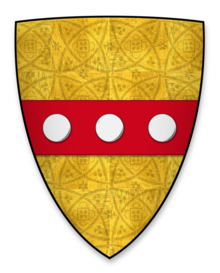William de Huntingfield
William of Huntingfield (also de Huntingfield ; † before October 1225) was an English nobleman and rebel. He belonged to the aristocratic opposition that wrested the recognition of the Magna Carta from King John Ohneland in 1215 .
Life
William was a son of the East English nobleman Roger of Huntingfield , after whose death around 1203 he inherited his property. This included several goods in the Honor of Eye in Suffolk , including the eponymous Huntingfield , as well as some other goods in Lancashire and other parts of the country. In 1203 he served as Hubert de Burgh's overseer of Dover Castle , and from 1208 to 1209 he served the king as a traveling judge. He was then from 1209 to 1210 Sheriff of Norfolk and Suffolk. During the papal interdict he administered the estates of St Benet Abbey in Hulme, Norfolk, as well as the estates of his brother Roger, who was a clergyman. Several of his knights took part in King John's campaign to Ireland in 1210 , and he himself took part in the king's campaign in Poitou in 1214 .
So he had been a loyal vassal of the king until Easter 1215 in Stamford with other East English barons of the aristocratic opposition around Robert FitzWalter . The main reason for this was probably his debt. Although the king had canceled his debts of 100 marks that he had inherited from his father, William was still heavily indebted to Johann, as he, like other barons, had to pay large amounts of money for various rights and guardianship. He also had good contacts with Robert FitzWalter, one of the leaders of the rebels. In return, the king ordered his lands to be confiscated on May 12th.
After the Magna Carta was recognized in June 1215, William was elected one of the 25 barons who were to oversee the king's compliance with the charter. After the open war of the barons in the fall of 1215 , William stayed on the side of the rebels. In February 1216, the King gave William's castle in Frampton to Nicola de la Haye , and William took her to court after the Civil War for £ 270 compensation for allegedly stolen cattle. After the French Prince Ludwig landed with an army in England at the invitation of the rebels in May 1216 and claimed the English throne, William Robert FitzWalter and William de Mandeville supported when they conquered East Anglia for the rebels . On his way through eastern England in October 1216, King John had Williams' lands ravaged and plundered in revenge.
In May 1217 William, like Richard de Montfichet and other barons, was captured at the Battle of Lincoln and remained captive until the Peace of Lambeth , which ended the Barons' War. In September 1217, two of his knights negotiated the ransom on his behalf. He was pardoned and again took part in a royal council in 1218.
progeny
He died before October 1225, maybe as early as 1224. He left at least two children:
- Roger († 1257)
- Alice ∞ Sir Richard de Solars († around 1211)
His son Roger became his heir.
Web links
- Nigel Saul: Magna Carta 800th: William de Huntingfield
- Ralph V. Turner: Huntingfield, William of (d. In or before 1225). In: Henry Colin Gray Matthew, Brian Harrison (Eds.): Oxford Dictionary of National Biography , from the earliest times to the year 2000 (ODNB). Oxford University Press, Oxford 2004, ISBN 0-19-861411-X , ( oxforddnb.com license required ), as of 2004
| personal data | |
|---|---|
| SURNAME | William de Huntingfield |
| ALTERNATIVE NAMES | William of Huntingfield |
| BRIEF DESCRIPTION | English nobleman and rebel |
| DATE OF BIRTH | 12th Century |
| DATE OF DEATH | between 1224 and October 1225 |
